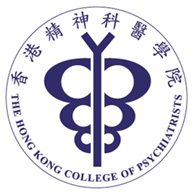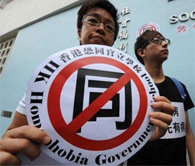Unnoticed in the media and so far ignored by government, the Hong Kong College of Psychiatrists at last put its neck on the line by issuing a brief public statement of its views on sexual orientation and on the faith-based ‘therapies’ which purport to alter it. Their statement reads:
Position Statement of The Hong Kong College of Psychiatrists on Sexual Orientation

The Hong Kong College of Psychiatrists opines that homosexuality is not a psychiatric disorder.
The American Psychiatric Association removed homosexuality from the diagnostic glossary of mental disorder (DSM) in 1973. The International Classification of Disease of the World Health Organization followed the same decision in 1992.
The Hong Kong College of Psychiatrists adheres firmly to the practice of scientifically proven and evidence-based treatment. Psychiatric treatments have to be provided according to well established principles and practice available at the time. There is, at present, no sound scientific and clinical evidence supporting the benefits of attempts to alter sexual orientation.
A psychiatrist should provide care with no discrimination and maintain a high level of sensitivity to the needs of people from diverse backgrounds.
Prepared by The Hong Kong College of Psychiatrists Ltd (香港精神科醫學院)

Is this rather bland statement a matter of interest? I believe that it is, more so that it is one of great import, and if you will bear with me through this article, I hope you will end by agreeing with me. Firstly, and this may simply be down to the insular ignorance of this writer (who will no doubt be corrected pretty quickly by you, the reader), I know of no other Asian psychiatric or psychological professional body that has followed the examples of their corresponding bodies in the United States, the United Kingdom, Europe or Australasia in sticking out their necks and making a statement on this issue. This seems to me to be something of a continental first.
Secondly, certainly in Hong Kong no professional organisation has issued such a statement before, so until this statement there has been no ‘official’ guidance on the matter. This has, until now, enabled the government to pretend that the issue remained subject to debate. The government has hitherto been able to adopt, therefore, a detached position of seeming to arbitrate or balance between the two sides of the LGBT rights argument, hiding as it does so beneath the liberal cloak of maintaining ‘the freedom of speech’. Because of the new statement, it will be able to evade the issue in this way no longer.
Thirdly, activists in Hong Kong will no longer have to adduce arguments based upon foreign professional pronouncements in support of their cause. They now have a locally produced weapon with which to attack government inactivity or discrimination and to counter the public assaults of the fundamentalist right. They no longer have to prove these issues; in future they will be able to quote the College of Psychiatrists’ statement as proof that those with more professional standing than anyone likely to be in the room have ruled thus. In hide-and-precedent-bound Hong Kong, this is a powerful weapon indeed.
So how did this unusual statement come about? The roots of the story lie back last June when the government appointed ‘reparative therapy’ advocate, psychiatrist Dr Hong Kwai-wah, to teach its social workers issues of sexual orientation. This caused a furore locally after activists from the Women Coalition of the HKSAR and Rainbow picketed the venue. Word of this spread worldwide. A signature campaign was launched online and a demonstration was held outside the Hong Kong trade offices in New York. The Tongzhi Community Joint Meeting (TCJM), Hong Kong’s LGBT alliance, managed to persuade the Social Welfare Department to attend a meeting to hear the community’s complaints and demands, but in the event the department accepted no blame, acceded to no requests and refused to meet LGBT activists again.
So, the Hong Kong government stonewalled, but it was severely embarrassed, and it is unlikely that Dr Hong will be called upon to grace its lecture halls again. While this was going on, the TCJM lobbied the Hong Kong College of Psychiatrists and the Hong Kong Psychological Association, as well as every psychiatric and psychological teaching department in Hong Kong’s tertiary education system, demanding that they make their professional views known of the mumbo jumbo taught by Dr Hong and that they take steps to prevent the harm he was doing to local youth.
Both psychiatrists and psychologists responded by instituting meta-studies of worldwide academic investigations into the clams of faith-based therapies. Both bodies indicated that these studies would enable their Councils to adopt policies and issue statements on the issue. The College of Psychiatrists’ study is expected to conclude soon; that of the Psychological Association will be complete, they say, by mid 2012. Whilst we cannot be sure that either results or statements will support the LGBT case, it is highly unlikely, given the developments in mental health in the rest of the world and the results of similar studies elsewhere, that they will disappoint. It would be strange indeed if Hong Kong’s professionals, trained as they often are in the great schools of the United States, the United Kingdom and elsewhere, were to come to radically different conclusions from the professional bodies of those places.
The College of Psychiatrists clearly felt the need, though, to go further quicker, and in November put out the statement you have read above based upon the experience and practice of its members.
Activists’ intentions are to make as much public fuss around the publication of the professional studies and statements as possible, and to lobby government and legislature to recognise and acknowledge their validity. They will seek commitments from the government that its departments, especially health, education and social welfare, adopt policies congruent with these statements and expend no funds in ways that would run counter to the professional advice contained within them.
A way is being cleared, therefore, to take the fight against faith-based therapies and the failure to tackle homophobic school bullying into the heart of Hong Kong’s government.
The community will have much to thank its mental health specialists for in the struggles to come.
